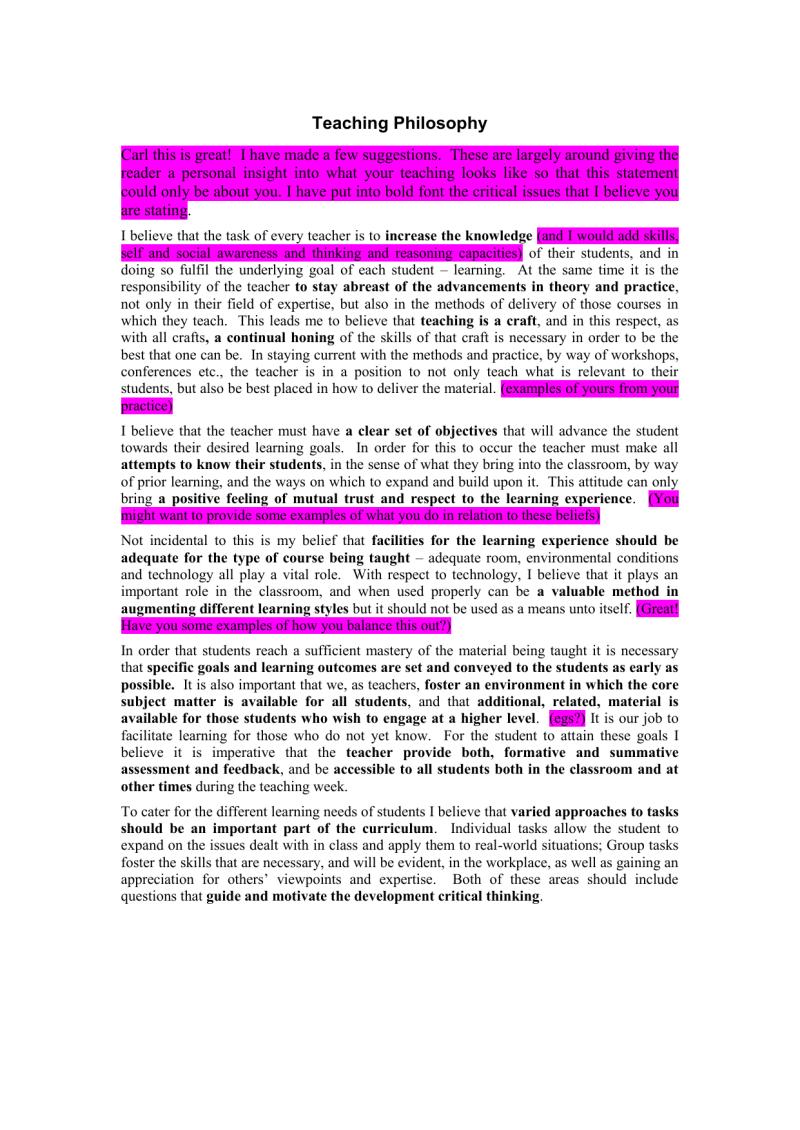What is teacher philosophy?
Teacher philosophy refers to the set of beliefs, values, principles, and assumptions that guide an educator's approach to teaching and learning. It encompasses the teacher's views on the purpose of education, the role of the teacher and students, preferred teaching methods, and the overall goals of the educational process. Teacher philosophy influences how educators design their lessons, interact with students, and create a learning environment.
Here are some key components often included in a teacher's philosophy:
Beliefs about Learning:
- What do teachers believe about how students learn best? This may include perspectives on the role of prior knowledge, the importance of active engagement, and the significance of hands-on experiences.
Purpose of Education:
- Teachers may have different views on the purpose of education. Some may emphasize the acquisition of knowledge and skills, while others may prioritize the development of critical thinking, creativity, or character.
Role of the Teacher:
- How teachers see their role in the classroom can vary. Some may adopt a more traditional, authoritative role, while others may prefer a facilitative or collaborative approach. The teacher's role may involve guiding, mentoring, or coaching students.
Role of Students:
- Teachers' philosophies often include perspectives on the role of students in the learning process. This may encompass students' responsibility for their own learning, the encouragement of curiosity and self-discovery, and the promotion of independence.
Teaching Methods:
- Teachers may have preferences for certain teaching methods or pedagogical approaches. This could include experiential learning, project-based learning, collaborative learning, or other instructional strategies.
Assessment and Evaluation:
- How teachers assess and evaluate student learning is influenced by their philosophy. Some may emphasize standardized testing, while others may prefer more authentic assessments, such as projects, presentations, or portfolios.
Cultural and Inclusive Practices:
- Teachers' philosophies may include perspectives on diversity, equity, and inclusion. This can involve valuing diverse perspectives, adapting teaching methods to accommodate various learning styles, and creating an inclusive classroom environment.
Lifelong Learning:
- Teachers may believe in the importance of continuous professional development and lifelong learning, both for themselves and their students.
Classroom Management:
- Philosophies on classroom management may vary, including views on discipline, motivation, and creating a positive and respectful learning environment.
Community Engagement:
- Some teachers may believe in actively involving the community in the educational process, fostering partnerships between schools and local organizations or parents.
Understanding a teacher's philosophy is crucial for educators, students, and parents, as it provides insight into the principles that guide the teaching and learning experiences within the classroom. A well-defined philosophy helps teachers make decisions, adapt to different situations, and maintain consistency in their educational approach.
Exploring the concept of a teacher's philosophy in education
A teacher's philosophy in education is a fascinating concept that delves into the core beliefs and values that guide their approach to teaching and learning. It's not just about delivering facts and figures; it's about nurturing a classroom environment that fosters intellectual curiosity, personal growth, and a love for knowledge.
Here are some key aspects to explore when examining a teacher's philosophy:
Core beliefs:
- What is the purpose of education? Is it about acquiring knowledge and skills, developing critical thinking, fostering social responsibility, or a combination?
- How do students learn best? Does the teacher believe in traditional instruction, hands-on activities, collaborative learning, or personalized approaches?
- What role does the teacher play in the learning process? Are they a facilitator, a guide, a mentor, or an authority figure?
- What is the importance of assessment? Is it about measuring knowledge retention, assessing critical thinking skills, or providing feedback for improvement?
Values:
- Equity and inclusion: Does the teacher value diversity and strive to create a classroom where all students feel respected and supported?
- Critical thinking and creativity: Does the teacher encourage students to question, analyze, and come up with original ideas?
- Lifelong learning: Does the teacher emphasize the importance of continuous learning and intellectual curiosity?
- Collaboration and communication: Does the teacher encourage students to work together, share ideas, and effectively communicate their thoughts?
Putting it into practice:
- Teaching methods: How does the teacher's philosophy translate into具体的な教学方法? 例如,如果他们重视学生主动学习,他们可能会使用基于项目的学习、探究式学习或协作学习。
- Classroom environment: Does the classroom atmosphere reflect the teacher's values? Is it safe, welcoming, and conducive to learning?
- Assessment strategies: Are assessments aligned with the teacher's philosophy of learning? Do they go beyond simple memorization and encourage critical thinking and reflection?
Exploring different philosophies:
There are various educational philosophies that inform teachers' approaches, such as:
- Progressivism: Emphasizes student-centered learning, hands-on activities, and critical thinking.
- Constructivism: Believes that students actively construct their own knowledge through experiences and interactions.
- Essentialism: Focuses on teaching essential knowledge and skills for success in life.
- Perennialism: Values the study of classic works and timeless principles to develop well-rounded individuals.
Understanding a teacher's philosophy can offer valuable insights into their classroom dynamic, their expectations for students, and their overall approach to education. Ultimately, it's about creating a learning environment that meets the unique needs and potential of each student.
Feel free to ask any specific questions you have about teachers' philosophies or different educational approaches. I'm happy to dive deeper into any aspect that sparks your curiosity!










